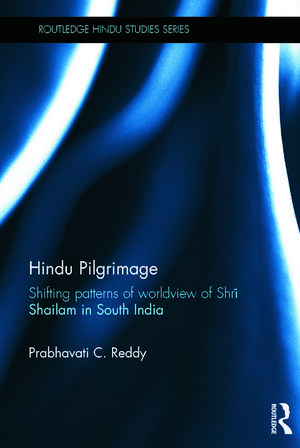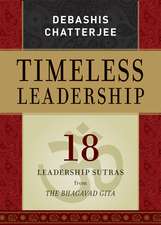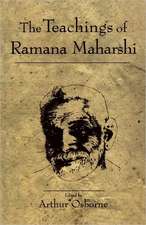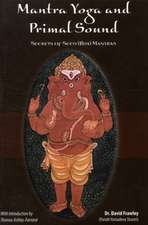Hindu Pilgrimage: Shifting Patterns of Worldview of Srisailam in South India: Routledge Hindu Studies Series
Autor Prabhavati C. Reddyen Limba Engleză Hardback – 26 mar 2014
Reddy blends religion, anthropology, art history and politics into one interdisciplinary exploration of how Shrî Shailam became the epicentre for Shaivism. Through this approach, the book examines Shrî Shailam’s influence on pan-Indian religious practices; the amalgamation of Brahmanical and regional traditions; and the intersection of the ideological and the civic worlds with respect to the management of pilgrimage centre in modern times.
This book is the first thorough study of Shrî Shailam and brings together phenomenological and historical study to provide a comprehensive understanding of both the religious dimension and the historical development of the social organization of the pilgrimage place. As such, it will be of interest to students of Hinduism, Pilgrimage and South Asian Studies.
Din seria Routledge Hindu Studies Series
-
 Preț: 312.03 lei
Preț: 312.03 lei - 15%
 Preț: 404.27 lei
Preț: 404.27 lei -
 Preț: 469.34 lei
Preț: 469.34 lei - 16%
 Preț: 335.76 lei
Preț: 335.76 lei -
 Preț: 411.42 lei
Preț: 411.42 lei - 31%
 Preț: 762.97 lei
Preț: 762.97 lei -
 Preț: 484.47 lei
Preț: 484.47 lei - 15%
 Preț: 296.53 lei
Preț: 296.53 lei - 18%
 Preț: 1059.84 lei
Preț: 1059.84 lei - 25%
 Preț: 766.65 lei
Preț: 766.65 lei -
 Preț: 414.32 lei
Preț: 414.32 lei -
 Preț: 309.69 lei
Preț: 309.69 lei - 31%
 Preț: 765.43 lei
Preț: 765.43 lei - 18%
 Preț: 1054.71 lei
Preț: 1054.71 lei - 15%
 Preț: 455.81 lei
Preț: 455.81 lei -
 Preț: 446.75 lei
Preț: 446.75 lei -
 Preț: 442.68 lei
Preț: 442.68 lei - 16%
 Preț: 300.29 lei
Preț: 300.29 lei -
 Preț: 414.32 lei
Preț: 414.32 lei - 18%
 Preț: 1056.14 lei
Preț: 1056.14 lei - 18%
 Preț: 1057.75 lei
Preț: 1057.75 lei -
 Preț: 486.42 lei
Preț: 486.42 lei -
 Preț: 475.88 lei
Preț: 475.88 lei -
 Preț: 411.85 lei
Preț: 411.85 lei - 18%
 Preț: 1222.16 lei
Preț: 1222.16 lei - 28%
 Preț: 821.79 lei
Preț: 821.79 lei - 15%
 Preț: 466.60 lei
Preț: 466.60 lei - 18%
 Preț: 1057.89 lei
Preț: 1057.89 lei -
 Preț: 469.34 lei
Preț: 469.34 lei -
 Preț: 486.98 lei
Preț: 486.98 lei - 31%
 Preț: 763.39 lei
Preț: 763.39 lei -
 Preț: 411.64 lei
Preț: 411.64 lei - 18%
 Preț: 1002.80 lei
Preț: 1002.80 lei - 26%
 Preț: 762.89 lei
Preț: 762.89 lei - 18%
 Preț: 1339.41 lei
Preț: 1339.41 lei
Preț: 1059.84 lei
Preț vechi: 1292.49 lei
-18% Nou
Puncte Express: 1590
Preț estimativ în valută:
202.86€ • 220.43$ • 170.52£
202.86€ • 220.43$ • 170.52£
Carte tipărită la comandă
Livrare economică 21 aprilie-05 mai
Preluare comenzi: 021 569.72.76
Specificații
ISBN-13: 9780415659970
ISBN-10: 0415659973
Pagini: 238
Ilustrații: 18 black & white illustrations, 1 black & white tables, 13 black & white halftones, 5 black & white line drawings
Dimensiuni: 156 x 234 x 20 mm
Greutate: 0.6 kg
Ediția:1
Editura: Taylor & Francis
Colecția Routledge
Seria Routledge Hindu Studies Series
Locul publicării:Oxford, United Kingdom
ISBN-10: 0415659973
Pagini: 238
Ilustrații: 18 black & white illustrations, 1 black & white tables, 13 black & white halftones, 5 black & white line drawings
Dimensiuni: 156 x 234 x 20 mm
Greutate: 0.6 kg
Ediția:1
Editura: Taylor & Francis
Colecția Routledge
Seria Routledge Hindu Studies Series
Locul publicării:Oxford, United Kingdom
Public țintă
PostgraduateCuprins
Part I: Exploring Shrî Shailam: Why another book on a Hindu Pilgrimage Site? 1. Introduction 2. Theoretical Approaches and Methods 3.Book Chapters Part II: The Sacred Mountain of Shiva: The Place: Idealization, Materialization, and Sanctification 4.The Place in the Process of Idealization 5. The Place in the Process of Materialization 6.The Place in the Process of Sanctification Part III: Religious Communities Making the History of Shrî Shailam 7. Early History of Shrî Shailam 8.The Emergence of the Shaiva Tîrtha-Kshetra, 9. The Crystalization of the Greater Shrî Shaila Kshetra 10. The Vîra Shaivas and the Âradhya Shaivas Part IV: The History and Development of the Pilgrimage Center in Modern Period 11. The Pilgrimage Center in the 18th and 19th Centuries 12. The Endowments DepartmentofAndhra Pradesh as the Custodian of Hindu Religious Institutions and Charitable Endowments 13. The Endowments Department of Andhra Pradesh and the Management of the Pilgrimage Center 14.Conclusion
Notă biografică
Prabhavati C. Reddy is an Adjunct Professor of Religion at George Washington University. She is an interdisciplinary scholar with a Ph.D in South Asian Studies from Harvard University, an M.A. in Asian Art History from the University of Texas-Austin, and an M.A & M.Phil in History and Archaeology from Osmania University.
Descriere
This book analyses the phenomenon of pilgrimage as a religious practice and experience and examines Shrî Shailam, a renowned south Indian pilgrimage site of Shiva and Goddess Durga. In doing so, it investigates two dimensions: the worldview of a place that is of utmost sanctity for Hindu pilgrims and its historical evolution from medieval to modern times. Reddy blends religion, anthropology, art history and politics into one interdisciplinary exploration of how Shrî Shailam became the epicentre for Shaivism. Through this approach, the book examines Shrî Shailam’s influence on pan-Indian religious practices; the amalgamation of Brahmanical and regional traditions; and the intersection of the ideological and the civic worlds with respect to the management of pilgrimage centre in modern times.













